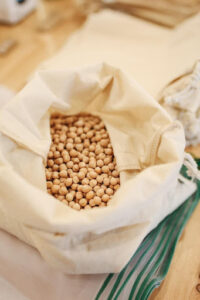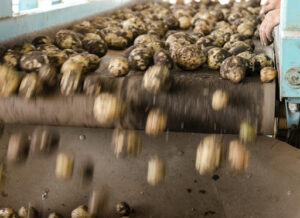7 Reasons Why Soy Farmers Use Technologies To Improve Efficiency
Many aspects of the world and our lives have felt the impact of technology, including agriculture. The areas in agriculture that have felt the change include fertilizers, pesticides, seeds, and herbicides.
Modern farmers have further input technology in soybean processes, increasing efficiency and yields. There are three major international soybean farmers, the United States, Brazil, and Argentina, having 34%, 32%, and 15%, respectively, contributing almost 81%.
Technology has made it easy to convert this crop to food or fuel with continuous improvements to reach a sustainable height in efficiency.
With tech, it is now possible to plant soybeans in impossible soils through agricultural biotechnology. In fact, genetic engineering has made soy seeds that include attributes of different varieties of crops, making them resistant to pests, drought, and diseases.
Technology and sustainable practices make soybean a sustainable, functional, and healthier crop. Modern innovations include regenerative agricultural methods and advanced biotechnology innovations.
Among all nations USA tops in the usage of technology for producing U.S. Soy products through innovation, making them healthier and long-lasting.
According to the Ministry of Food and Agriculture, 2017a and 2017b shows that an average soy farm in Ghana makes over 1,3Mt/ha instead of 3.0Mt/ha, keeping them below the average bar. To overcome this case, United Soybean Board has incorporated practices and innovations to improve their input efficiency and practices to improve farming methods.
However, embracing the technology is hindered by certain factors, such as:
- Institutions, economy, and society.
- Benefits, farmland, and technology cost.
- Education, social group, age, and gender.
Reasons To Implement Technology:
1. Improved Efficiency
Technology has increased the productivity of soy production with less work. Thus, the incorporated new tools increase efficiency, causing less time to complete farm work and focus on other tasks. This helps increase efficiency and production.
2. Increased Capacity for Growth
Farmers are expanding their businesses by adding extra land to grow crops without increasing hires or staff. The cost of hiring workers is covered by technology allowing farmers to use the money in expanding facilities and market targets.
3. Increased Productivity
Technology has increased productivity by spending less time but accomplishing more tasks. In addition, farmers use technology to increase the quality of their crops, helping them rank high among competitors and appealing products to customers.
4. Saving Time and Money
The variable rate seed and fertilizer application practices save money by reducing the amount needed to cover the farm with precision. It allows farmers to use what they need and where it is needed, saving them a few dollars. There is also software like Pipe Planner helping farmers to operate irrigation farming, thus saving money on fuel and electricity in the long run.

5. Increased Communication
Innovation allows soybean farmers to work smarter instead of harder. Farmers spend less time completing farm tasks, increasing their communication and putting the rest of their time on accomplishing other tasks on the farm. The implementation helps farmers during harsh seasons and farmers with multiple jobs. Modern farmers easily communicate with other farmers as well as customers, effectively improving production and work quality.
6. Improved Safety and Security
Farmlands are secure with technology by reducing the causes or risk of accidents, especially in farms using heavy machinery or animals. Innovation creates better tools such as tractors, surveying drones, crop scouting, automated milkers to keep animals out of danger, also to take care of animal nutrition, and many others.
7. Increased Accessibility
Technology has increased the market reach of farmers. Modern farmers can sell their products around the world without traveling. They do this through the internet, connecting them to customers, businesses, and suppliers than have a high impact on their farm business.
Technology Tools in Agriculture
The agricultural sector faces many implementations of technology, including
1. Farm Machines
Labor demand is a common issue in farming soybeans, and it continues to increase, requiring better practices. These practices, such as combining harvesters and planters, are to reduce labor costs and simplify the process. Soybean farming is diligent in yielding and time management, meaning it is best to sow early and harvest on time to have a bounty yield that needs timing storage. Technology in soy farming has made it easy for farmers to grow qualified food quickly.
In addition, technology has self-driving sprayers and tractors that use GPS to navigate the farmland, promoting better and more efficient farming methods. The innovation eliminates human error and saves fuel and equipment.
2. Crop Sensors
Applying fertilizers and pesticides is another challenge. Knowing which chemical to apply, how to apply it, and the best product to use in different scenarios is difficult. Technology has created sensors to facilitate the application of fertilizers and pesticides through variable technology. Modern farmers can feel their plants, thus, reducing leaching or runoff. In addition, the sensors indicated the right amount of resources for soy crops and application time.

3. Global Positioning Systems (GPS)
GPS in agriculture helps farmers document their farmland status. The implementation makes it easy to figure out an account for their farm yields and keep records of application rates. In addition, farmers can use these collected and documented data for future reference in making decisions. For example, they can use a yield map to summarize their farm activities for the year. This technology provides a wide range of information, including the farm status, imagery system, etc.
4. Biotechnology
Biotechnology is a common innovation with a high influence on agriculture. The process is often referred to as genetic engineering, which focuses on improving soybean genes to better withstand farm conditions. The engineering process is to increase resistance to agricultural chemicals like herbicides and decrease weed growth and the effect of insects/pests.
The benefits increase yield and profits and present a different variety of seeds through precision farming. In addition, farmers can farm in arid areas where it is impossible to grow crops. Precision farming uses technology to improve the efficiency of soybeans production and yield.
These technologies include GPS, satellite mapping, and many more, helping farmers cultivate their farmland more efficiently. In addition, technology in agriculture also focuses on increasing the nutrient value of crops to benefit customers, prepare them for harsh weather conditions, and improve malnutrition in soy crops.
The Future of Technology in Agriculture
Agricultural farmers are facing rapid advancement in agricultural technology (AG) in modern days. The implementation ranges from precision farming to the proliferation of drones increasing the brightness of future farming.
Technology prepares the farmer for the inevitable shift in farming methods. In addition, technology has affected other ways of doing things in the community by creating a better life for farmers. They also implement technology to enhance the safety of farmers and their farmlands, thereby making farming practices environmentally friendly.

Conclusion
Farmers cannot deny the benefits of technology in agriculture. There is an increase in production, an increase in workers’ safety, a decrease in natural ecosystem effects on plants, and a decreased use of chemicals and water, etc. However, farmers can only reach a beneficial level if they understand how to implement modern farming practices and technology in performing tasks.


